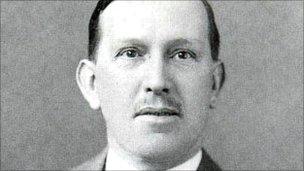Scapa Flow WWI salvage efforts remembered
- Published
![Crew of a German boat abandon ship in 1919 [Pic: Orkney Library and Archive]](https://ichef.bbci.co.uk/ace/standard/464/mcs/media/images/48530000/jpg/_48530264_scapa_flow_1919_464.jpg)
The German fleet was sunk by their crews at the end of WWI
A ceremony has taken place in Orkney to commemorate what is regarded as one of the most remarkable feats of marine salvage ever achieved.
Ernest Cox masterminded the recovery of 34 ships of the German fleet sunk by their crews in the waters of Scapa Flow at the end of WWI.
Lauded by the media of the day, his work is now all but forgotten.
Relatives unveiled a special plaque at Lyness, where the salvage operations were based, as a reminder.

Ernest Cox used compressed air to bring up some vessels
By 1924, the German fleet had lain submerged throughout the Royal Navy anchorage of Scapa Flow for five years and the accepted wisdom was that this was where they would remain.
However Mr Cox was determined to raise as much of the valuable metal from the seabed as he could and bought the rights to salvage the fleet.
He developed methods to help refloat the ships, many of which are still used in marine salvage to this day.
Mr Cox bought a massive floating dry dock which he modified and fitted out with rows of winches.
He also used compressed air to bring up vessels.
The remaining wrecks today attract divers from around the world.